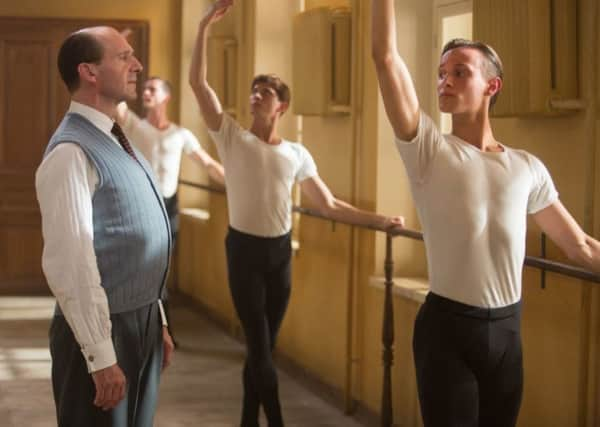Film reviews: The White Crow | Minding the Gap


The White Crow (12A) **
Minding the Gap (15) *****
Having made his directorial debut with an urgent, visceral, blood-spattered take on Coriolanus back in 2012, it’s a little disappointing to see Ralph Fiennes settling into a side career helming respectable, snoozy biopics of famed cultural figures. First came The Invisible Woman, which took a very Sunday-night-TV-drama approach to the otherwise fascinating story of Charles Dickens’s mistress, Nelly Ternan. Now comes The White Crow, a by-the-numbers film about the early life of Soviet ballet dancer Rudolph Nureyev, whose defection to the West in 1961 helped make him the most famous dancer in the world.
Framing the film with that infamous “leap for freedom” at Le Bourget Airport in Paris, Fiennes and screenwriter David Hare jump back-and-forth in Nureyev’s life to trace not only the events of that fateful visit to Paris by the Kirov company at the height of the Cold War, but also Nureyev’s poverty-stricken childhood in Bashkortostan and his later determination as a rule-breaking 17-year-old ballet student to make up for lost time (he began training at the Vaganova Academy in St Petersburg much later than most pupils) by talking his way into the class of famed teacher Alexander Pushkin. It was Pushkin (played in the film by Fiennes, who learned Russian for the part) who took him under his wing, and eventually into his home, helping him harness and channel his wild spirit into an art form defined by its precision.
Advertisement
Hide AdAdvertisement
Hide AdThat’s all meaty material for a biopic and initially Fiennes stays true to Nureyev by taking a more abstract approach to the story, one that reflects the dancer’s defiant attempt to push against the strictures of both the times and his chosen art form. Keeping his roving camera close up on people, on buildings, on the great paintings and sculptures that the insatiably curious Nureyev (played by dancer and first time actor Oleg Ivanko) spent his spare time poring over, Fiennes subtly builds up a sense of how hemmed in his subject has been for his entire life – and of the tantalising escape from this life art and culture seems to be offering him as he travels to Paris for the first time.
But you don’t really hire David Hare – the dreariest of all Britain’s theatre-trained bluechip screenwriters – to write visually arresting cinema, and it’s not long before the pair of them revert to a more conventional and leaden form of filmmaking, seizing on the most obvious of metaphors (Nureyev was born on a train, so naturally they fill the film with trains just in case you don’t get that he’s also from the wrong side of the tracks) and spelling out the themes in dialogue rather than teasing them out organically. Thus we get conversations about the conflict between tradition and innovation rather than artful demonstrations of that conflict; or we get conversations about the stylistic difference between French and Russian-trained ballet dancers, not meaningful visual representations of that difference.
It’s as if Fiennes as a director doesn’t trust his own artistic instincts – ironic given the subject – and it all rather defeats the object of hiring an experienced dancer rather than an experienced actor for the lead. To be fair to Ivanko, his training, taut physique and sharp cheek bones do make him look enough like the young Nureyev to convince in the role, whenever he’s in the studio or on the stage, but when he’s not – which is often – he trips over Hare’s lumpen dialogue and isn’t really capable of communicating the absolute fear that lay beneath Nureyev’s abrasive and arrogant persona, especially when it became clear his career might be curtailed by the political whims of Mother Russia. When we do eventually get to the actual defection, the film defaults to creaky spy movie mode and any hope that it will soar gracefully like its subject vanishes.
If ballet offered a possible escape from poverty and oppression for Nureyev, the dream that skateboarding might do the same for the real-life protagonists of Bing Liu’s stunning Oscar-nominated documentary Minding the Gap is one we see its subjects frequently escaping into as they skate around their hometown of Rockford, Illinois, an increasingly impoverished city in the heart of the American rustbelt that’s still smarting from the ramifications of the 2008 financial crisis and the embedded racism and violence that economic dislocation only intensifies. Having filmed himself and his friends on-and-off since childhood, Liu’s from-the-board observations on his own life and that of close friends Zack and Keire cover the best part of a decade and, as he returns home to catch up with them, we get to see them growing up on camera and being hit with the onset of adult responsibilities. But where the film surprises is the way it gradually becomes a story about 21st century masculinity as Liu and his friends reckon with the domestic violence they each experienced (unbeknownst to one another) at the hands of their fathers and step-fathers. What emerges is a moving portrait of the trauma of adolescence and the momentary escape from it that skateboarding offered them. That can’t help but add power to the skateboarding scenes, which we see evolve from the endearingly scrappy to the (yes) balletic as Liu’s filmmaking skills advance in line with their collective skating skills. But it’s the tenderness and compassion that Liu brings to his friends’ stories, as well as the brave, sensitive way he confronts his own past, that marks this out as something special. ■